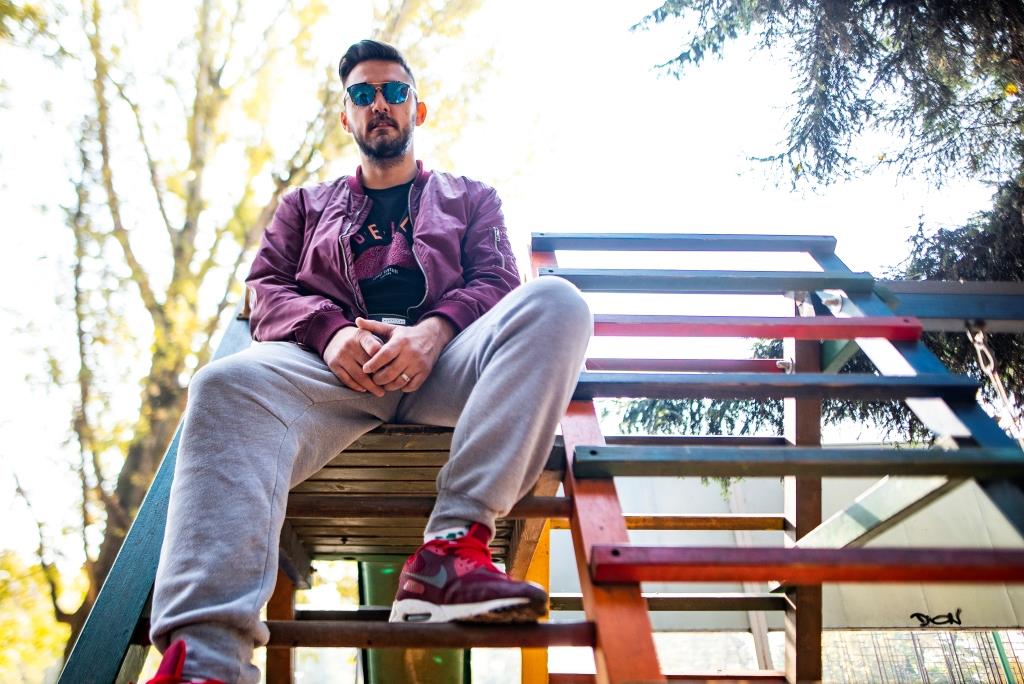
Adnan Hamidović, better known as Frenkie, is one of the rare artists on the Bosnian music scene who has continuously spoken out about pressing issues in BiH for almost two decades now.
For nearly 20 years, Frenkie has served as a symbol of urban thinking. Through his artistic endeavors, he has influenced the development of critical thinking among a large number of young people, not only in Bosnia and Herzegovina (BiH) but across the Balkans. His audience, which has gathered over two decades, continues to vigorously react to the “unfair” reality that surrounds them. In a sea of “influencers”, Frenkie is still recognized as one of the greatest fighters for social justice.
At the end of 2018, the song “Egzil” was released. Reminiscent of his 2002 hit song, “Hajmo ih rusit,” (Let’s bring ‘em down”), Frenkie says these two songs deal with the ever-present issue that youth are choosing to leave BiH as a result of the country’s difficult environment. He explains that Egzil was written to convey the feelings of loss that those who remain are left behind to experience.
“The fact that young people are choosing to leave BiH presents a big problem for the country and the region, and that’s exactly why this problem is the focus of our song. Many people can find themselves in the song, but also, when I compare these two songs, I can see that I have grown a lot since. I am no longer the same person I was in 2002, even though today we are still talking about the same topics, just in a more mature manner,” explains Frenkie.
He says that he found the inspiration for “Egzil”, and many other songs, in everyday life and the society that surrounds him.
“Inspiration is all around me. And it’s not inspiration, per say, but rather that we are forced to deal with the topics at hand. I’m thinking about these issues, talking to my friends about them, and then suddenly I realize that I can turn it into text, because it’s constantly there in my head and all around me. Then I realize that it’s time to say it out loud, in my own way, publicly – not just as small talk on coffee breaks. It is especially important to me that a lot of our fellow citizens think similarly,” he adds.
When asked what he believes is the biggest problem facing the youth in BiH, he responds, “A corrupt and unfair society that doesn’t recognize quality and hard work.” He adds that in BiH, hard work and honesty are not respected. It’s more important whose son or daughter you are or what political party you are a member of.
“The worst part is that young people are being openly separated into ethnic groups. The youth who have lost their will to fight these problems, – unfortunately, leave,” says Frenkie.
As he sees it, young people who go from London to Barcelona show their mobility, but in BiH, the process is only ever a one-way trip. “When young people leave, they leave for good. They only come back to visit on holidays. This is most worrying. There are many people from Tuzla, and my friends, that I am not aware that they have left. Sometimes, when I meet them in the summer, we have a chat and then I find out they have been living somewhere else for a long time. I would lie if I said that it doesn’t worry me,” he says.

On the other hand, Frenkie decided to stay in BiH because he believes that, despite its problems, this country does have something to offer. He knows it’s hard to succeed here, but innovative and painstaking work can yield positive results. He also decided to stay in BiH because of his family, the values he believes in and life, which he says is much different from that in the west, where he lived for a while.
Our interviewee often emphasizes the importance of family and fatherly pride in his public appearances. He says he thinks a lot about the future of his daughters.
“I think that every parent should be supportive of their children. I, too, think they themselves should decide whether they want to stay in BiH or look elsewhere. What matters to me is that they are happy and healthy, and I hope they can have a good future in Bosnia and Herzegovina,” he adds.
Although there is much talk about nationalism and division in the Balkans, the famous artist was one of the pioneers who, through his engagement, paved the way for peers and future generations when it comes to peacebuilding. There are almost no young activists from Bosnia to whom Frenkie wasn’t a role model and inspiration. The song “Pismo Milanu”, alongside the movie “Granica”, has already attracted a cult of fans. He worked with the Serbian peace activist Milan Colić to produce the song.
Frenkie always remarks on his excellent collaboration with the Serbian hip-hop artist Marko Šelić (Marcelo) and he also enjoyed recording a duet with his countrywoman, Ivana Rašić (Sajsi MC). When asked about the cooperation on their song “Svi”, the BH artist said that they were lucky that Indigo made “a beat that they both immediately liked.”
“We are aware that our cooperation was a real surprise for the audience in BiH and Serbia,” said Frenkie, “Of course, we are very pleased. Also, I would like to mention that we worked together on the text of the song, which again speaks of our desire to send a message of unity.”
His message to the young people: “Do not to be passive, because all your hard work and persistence will pay off at the end.”
_______________________________________________________________________________________________________________
This article was initially published within the Bosnian edition of ASBO Magazine in 2019. ASBO Magazine is an independent publication created by the D Foundation as an extension of its mission to unearth and showcase fresh talent. The magazine aims to showcase the artistic talents and potential of Bosnians and Herzegovinians in an effort to empower and give them an international platform to share their work, ideas, and opinions on music, fashion, art, and cinematography.






